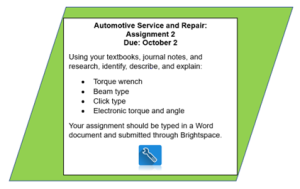26 Manage Your Assignments
Assignments require planning. You’ll need a clear understanding of what your instructor wants before starting an assignment. If you’re not sure, ask your instructor.
Step 1: Read the assignment carefully and determine requirements

Ask yourself:
- What is the assignment asking me to do?
- Who is my audience?
- What type of resources should I use?
- What work have I done in class that will help me with this assignment?
- When is the assignment due?
- What other tasks require time management around the due date?
- How do I submit the assignment when complete?
Step 2: Start an assignment Journal
Create a document and gather details about the assignment. Details like:
- Due date.
- Word count.
- Topic.
- Scope.
- Keywords.
- Resources needed.
- APA citation requirements.
Also start gathering:
- Answers to questions you asked in Step 1.
- Your topic ideas.
- Any brainstorming ideas you have.
- Resources as you find them.
- Any questions you may need to ask your instructor about the assignment.
Step 3: Look at the Rubric
The rubric is an assessment tool used by your instructor to guide how they assign marks to assignments. You can use the rubric to help understand your assignment and how it will be graded. If you have questions about the assignment or rubric, talk to your instructor.
When to use the rubric.
Before you begin working on your assignment, review the rubric. This will help you avoid wasting time on work that may not fit the assignment.
While you’re doing your final draft, grade yourself against the rubric and make sure you’ve hit all the key points.
Step 4: Create an Assignment Schedule
Add scheduled time to work on your assignment into your weekly schedule. Divide large tasks into several smaller ones to make it easier to get started and help you stay focused. Once you’ve completed smaller tasks, check them off to see your progress and to keep you motivated.
Don’t forget to consider any life events (i.e., work or appointments you need to attend) when you’re developing your schedule.
Time Management
Time management is a skill that helps you organize, plan, and schedule for upcoming tasks and commitments as well as deadlines. By using time management strategies, like daily to-do lists and weekly schedules, you can set clear expectations for yourself and have a plan for success.
For more information on how to develop a weekly schedule or use an assignment calculator, visit the Time Management Subject Guide.
Try it!
Review your assignment instructions and rubric. Use them to answer the following questions:
- In one sentence, describe your task for the assignment: What do you need to do?
- What resources will you need to complete this assignment? (textbook materials, handouts, or class notes that relate to this assignment.)
- How many additional resources do you need to find to complete the assignment task (e.g., articles, books, websites)? Where should you look for these resources?
- What content do you need to create for this assignment?
- What formatting do you need to follow for the assignment?
- What format do you need to use for citations and references?
- Do you know how to submit the assignment?
- Do you know where to go for support (e.g., Campus Library, Writing Centre, etc.)?
Assignment Scope: Overall description of the work. The range or depth of the subjects to be covered.
A guide listing specific criteria for grading or scoring academic papers, projects, or tests. [1]

